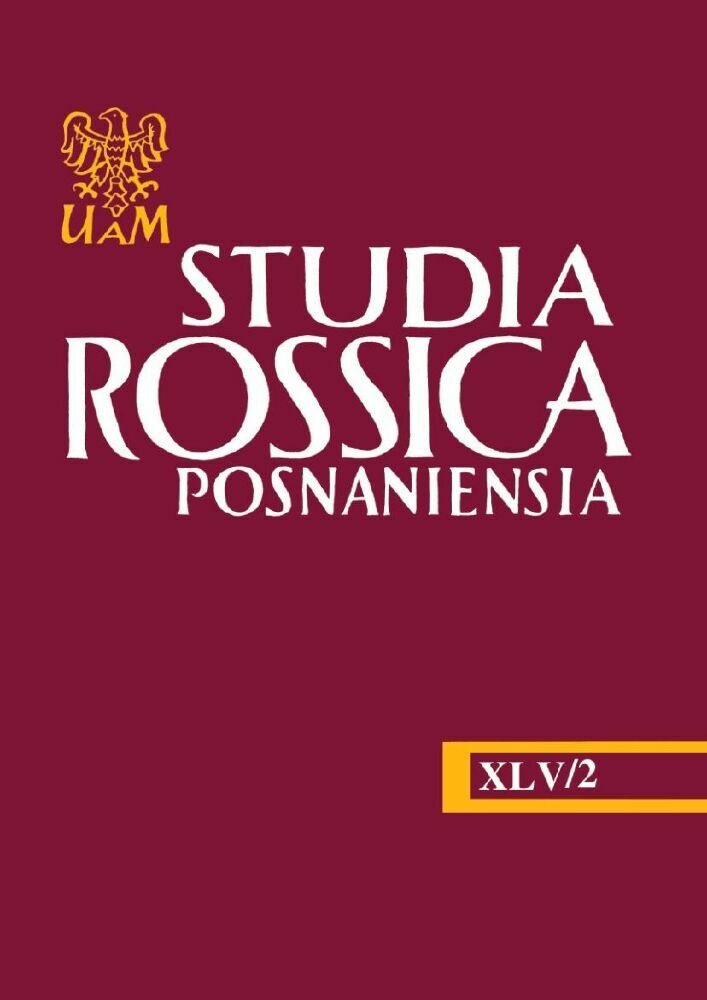Abstrakt
Compiling special dictionaries in Ukraine and Russia has its own history, national specifics, significant achievements and groundworks. Terminological dictionaries play an important role – they preserve and transmit the scientific terminology fund from generation to generation, which necessitates a critical examination of each specific publication. Terminographic criticism is an integral, interdisciplinary direction which is formed simultaneously on the basis of scientific criticism and scientific communication combining their features. As a result of the study, it was established that modern Ukrainian and Russian critics in their reviews adhere to the same principles to examine terminological dictionaries: the intention to comprehensively analyse, first of all, definition and translation publications as well as reference dictionaries, regarding the representation of their mega-, macro- and microstructure parameters; determining the national and linguacultural values of branch dictionaries. The potential importance of the practical application of the results lies in improving the theoretical and methodological principles and foundations of compiling terminological dictionaries, as well as their use in the development of new models of special publications, in particular dictionaries of a new type, which will comprehensively present the terminology of a certain field of science.
Bibliografia
Âcenko, Nìna. „Žanrovo-stilʹova specifìka naukovoï recenzìï”. Ukraïnsʹka mova, 1, 2017, s. 92–101.
Basovskaâ, Evgeniâ. „Sovetskijlingvističeskijpurizm: slovoidelo (namaterialеperiodiki 1920–1930-hgodov)”. VestnikRossijskogogosudarstvennogogumanitarnogouniversiteta. Ser. Filologiâ, 7, 2011, s.114–124.
Budykina, Vera. „K probleme leksikografičeskogo analiza slovarej. Pedagogičeskij slovarʹ K. Guda”. Filologiâ i čelovek, 2, 2014, s. 194–200.
Denisov, Petr. Osnovnye problemy teorii leksikografii. Avtoreferat dissertacii na soiskanie učenoj stepeni doktora filologičeskih nauk. Moskva, ANSSSR, Institut russkogo yazyka, 1976.
Gnatûk, Irina. „Prìoritetnì naprâmi doslìdženʹ z leksikologìï ta leksikografìï v sučasnìj slavìsticì”. Leksikografìčnij bûletenʹ, vip. 19, 2010, s. 232–238.
Gordìênko, Natalìâ. „Sučasna leksikografìâ âk ob``êkt lìngvìstiki”. Ukraïnsʹka mova, 3, 2011, s. 67–73.
Guba, Katerina. „Recenzirovanie kak sposob ocenivaniâ naučnyh rezulʹtatov: slučaj sociologii”. Antropologičeskij forum, 10, 2009, s. 32–43.
Hausmann, Franz. „The training and professional development of lexicographers in Germany”. Lexi-cography: An emerging international profession. Red. Robert Ilson. Manchester, Manchester University Press, 1986, р. 101–110.
Ìvanova, Olʹga. „Zmìst ta struktura ponâttâ «termìnologìčna leksikografìâ»”. Ukraïnsʹka ter-mìnologìâ ì sučasnìstʹ, vip. VII, 2007, s. 331–333.
Karpova, Olʹga. Anglijskaâ leksikografiâ. Moskva, Akademiâ, 2010.
Kosmeda, Tetâna. „Zbagačennâ ukraïnsʹkoï lìngvìstičnoï termìnologìčnoï leksikografìï. Rec. na slovnik: Zagnìtko A. P. Slovnik sučasnoï lìngvìstiki: ponâttâ ì termìni: u 4 t. Donecʹk: Donnu, 2012”. Lìngvìstičnì studìï, vip. 28, 2014, s. 194–198.
Mìrkìn, Boris, Yurіy Romanovich Šelâg-Sosonko,Ûrìj Ivan Dedû. „Èkologičeskij ènciklopedičeskij slovarʹ. Kišinev: Gl. red. Mold. Sov. Èncikl., 1990. 406 s.”. Ukraïnsʹkij botanìčnij žurnal, vip. 49, 3, 1992, s. 101–102.
Morgunûk, Vìtalìj. „Recenzìâ na Slovnik-dovìdnik termìnologìï muzejnictva” (Mikulʹčik R. ta ìn., Lʹvìv: Vid-vo Lʹvìvvsʹkoï polìtehnìki, 2012. – 128 s.). Vìsnik Nac. un-tu „Lʹvìvsʹka polìtehnìka”. Serìâ Problemi ukraïnsʹkoï termìnologìï, 765, 2013, s. 143–146.
Nielsen, Sandro. „The evaluation of the outside matter in dictionary reviews”. Lexikos, 19, 2009, s. 207–224.
Nikitin, Oleg. „Terminologičeskie slovari po âzykoznaniû XX–XXI vv.: lingvokulʹturologičeskij obzor”. Web. 16.07.2019. http://www.portal-slovo.ru/philology/44569.php.
Piotrowski, Tadeusz. Zrozumieć leksykografię. Warszawa, Wydawnictwo PWN, 2001.
Pozdranʹ, Ûlìâ. Rosìjsʹko-ukraïnsʹkij slovnik za redakcìêû A. Û. Krimsʹkogo ta S. O. Êfremova v ìstoriko-lìngvìstičnomu kontekstì: dis. ... kand. fìlol. nauk. Kiïv, 2017.
Stepanov, Boris. „Krizis žanra: knižnye recenzii v perspektive issledovanij naučnoj kommunikacii”. Laboratorium. Žurnal socialʹnyh issledovanij, 1, 2016, s. 82–106.
Stupin, Leonid. Leksikografiâ anglijskogo âzyka. Moskva, Vysšaâ škola, 1985.
Šelov, Sergej, Lûdmila Ryčkova. „Ob odnom tipe terminologičeskih slovarej i spravočnikov”. Russkij âzyk v naučnom osveŝenii, 2 (34), 2017, s. 250–273.
Ŝerbin, Vyacheslav. „Vklad O. N. Trubačeva v razvitie naučnoj kritiki slovarej”. Voprosy âzykoznaniâ, 5, 2007, s. 3–21.
Wiegand, Herbert. „On the Structure and Contents of a General Theory of Lexicography”. LEX-eter’83 Proceedings. Papers from the International Conference on Lexicography at Exeter (9–12 September). Tübingen, Max Niemeyer, 1983, p. 13–30. .
Licencja
PRACE PUBLIKOWANE W CZASOPIŚMIE DOSTĘPNE SĄ NA LICENCJI CREATIVE COMMONS:
Uznanie autorstwa-Użycie niekomercyjne-Na tych samych warunkach 4.0 Międzynarodowe.
Autorzy tekstów przyjętych do publikacji w czasopiśmie „Studia Rossica Posnaniensia” są zobowiązani do wypełnienia, podpisania i odesłania na adres redakcji umowy o udzielenie nieodpłatnej licencji do utworów, z zobowiązaniem do udzielania sublicencji Creative Commons.
Zgodnie z umową, autorzy tekstów opublikowanych w czasopiśmie “Studia Rossica Posnaniensia” udzielają Uniwersytetowi im. Adama Mickiewicza w Poznaniu niewyłącznej i nieodpłatnej licencji oraz zezwalają na użycie sublicencji Attribution-NonCommercial-ShareAlike 4.0 International (CC BY-NC-SA 4.0).
Autorzy zachowują prawa do dalszego, swobodnego rozporządzania utworem.
Autorzy, którzy wykorzystują w swoim tekście cudze utwory (np. ilustracje, fotografie) proszeni są o dostarczenie do redakcji czasopisma zgody na publikację.
Użytkownicy internetu uprawnieni są do korzystania z utworów opublikowanych po 2015 roku “Studia Rossica Posnaniensia” tylko w celach niekomercyjnych, pod następującymi warunkami:
https://creativecommons.org/licenses/by-nc-sa/4.0/
Uniwersytet im. Adama Mickiewicza w Poznaniu zachowuje prawo do czasopisma jako całości (układ, forma graficzna, tytuł, projekt okładki, logo itp.).

